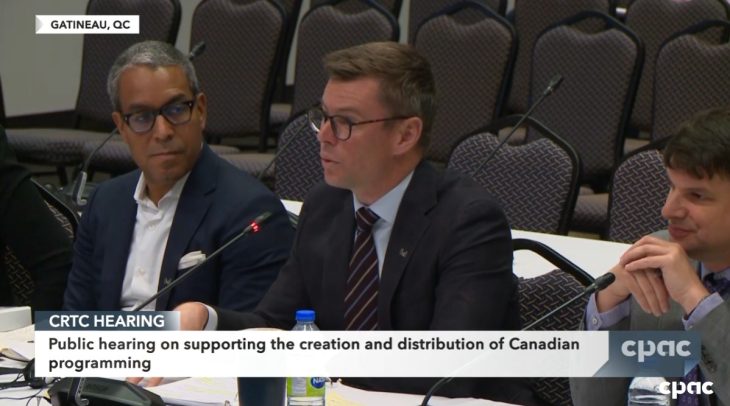
By Ahmad Hathout
Bell executives told the CRTC on Thursday that the broadcaster doesn’t need outside funding support for news production – just an easing of requirements on a losing product like community news.
“We’re losing $40 million a year in the conventional newscast,” said Jonathan Daniels, Bell’s vice president of regulatory law. “And so we looked at what would just be a better way that we could help finance that. And so we suggested that it was a redirecting of money from the community TV … because it’s just not been a very successful product.”
The executives said the company spends far more than what is required of it to spend on news, so the commission need not worry about a commitment to support locally reflective news content. The problem is that it spends multiples more on community TV than on other news content that can also serve the local communities.
“It’s the difference between a local newscast and the technical requirements always have a locally reflective news story,” added Mark Graham, the company’s senior vice president of legal and regulatory affairs. “So a story might be relevant to viewers in a local market — highly relevant — but it might technically be outside the footprint of that local market, and therefore sending a reporter to that story to report it into the local market doesn’t meet the definition of locally reflective news.
“The community element will continue to exist in the system,” Graham continued, “both through the streaming services and YouTube, and there are a lot of places – YouTube in particular –where that type of content is produced now … So the element will continue to exist. But for us, it’s much better bang for the buck for the system on news operations.”
Last year, Rogers asked the commission to allow it the flexibility to serve certain communities in western Canada with broader, but still locally relevant programming so that it doesn’t rely on reruns to meet its Canadian content obligations in the face of a tough financial environment for community TV.
Bell’s ask Thursday is part of a three-pronged recommendation to the commission to address what the company sees as an effort to break free from an outdated approach to regulating a different world, now with foreign streamers and online options.
Bell suggested that the commission allow for more flexibility on its overall Canadian expenditure requirements, known as CPE, and agreed with the regulator’s preliminary view that programs of national interest (PNI) requirements — which deals with funding high-risk content such as dramas and documentaries — may be outdated in light of what the company says are streamers providing that content as part of their core offering.
“You should let broadcasters direct their expenditures to where they believe audience demand is and to what will allow them to compete and succeed against the digital giants that are in the marketplace,” Graham said.
Bell executives reiterated that the flexibility offered by their proposal does not mean a reduction in spending — just that it would allow them to chase what is most relevant.
Justin Stockman, vice president of content development and programming, noted that the budget for the first season of Amazon Prime Video’s Lord of the Rings: The Rings of Power series is larger than Bell Media’s entire content budget, suggesting where there is an appetite for scripted content, Bell will spend.
“It is a bit of an arms race,” Stockman said about the pursuit of eyeballs. “We are incented to produce scripted content, documentaries at a high level.”
Bell executives also agreed with a suggestion by Quebecor reps on Wednesday that the public broadcaster should be made to step up on children’s programming, another PNI that is considered at-risk and that the private companies have had a difficult time sustaining.
Representatives for the Independent Broadcast Group (IBG) noted Thursday that children’s programming is expensive to produce and hard to monetize, but is still central to Canadian culture and identity and an area in which Canada has had global success (see Paw Patrol).
Speaking on the panel with the IBG, the publicly funded cable channel from British Columbia, Knowledge Network, said if major commercial channels “continue to move away from these genres of programming [children’s content and POV documentaries] – willingly or due to lack of regulatory support – then the role of public broadcasters like Knowledge to fill the gap will be even more important: to ensure that original kids programming and POV docs continue to be made and shared with Canadian audiences.
“Knowledge focuses on these categories of programming because of our mandate as a public broadcaster and not because of regulatory requirements or incentives. Directing funding resources, platform access and discoverability tools to support services working in documentary and children’s programming is going to be even more important in the future if the larger broadcasters focus on other priorities,” said Knowledge Network’s President and CEO Michelle van Beusekom.



